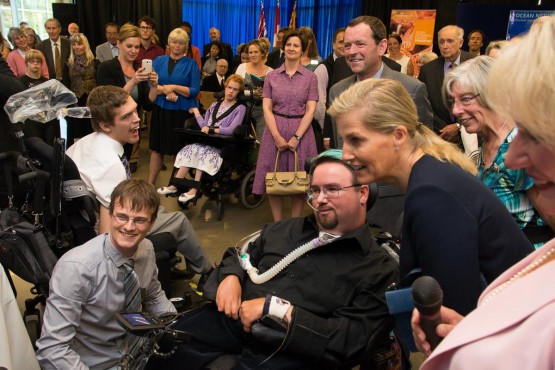
Dale Hampshire of CanAssist UVic demonstrates an adapted video game controller to Sophie Rhys-Jones, The Countess of Wessex, during a visit to the Bob Wright Centre at UVic on Sept. 13, 2014. She and her husband, Prince Edward, recently finished a five-day visit to B.C. –Hugo Wong (photo)
On Sept. 13, Sophie Rhys-Jones, the Countess of Wessex, accompanied by the lieutenant-governor of British Columbia, Judith Guichon, visited the Bob Wright Centre at UVic to learn more about the university’s endeavours as part of a five-day visit to B.C. with her husband, Prince Edward. Jamie Cassels, the university’s president and vice-chancellor, said the visit was “fantastic.”
“It’s great for the university because it allows us to show them, but more importantly to profile for the country and the community, the work that’s done at the University of Victoria to improve the lives of individuals and make the world a better place,” he said.
While at UVic, the countess learned about Ocean Networks Canada (ONC), the Centre for Athletics, Recreation, and Special Abilities (CARSA), and CanAssist. Her visit drew several members of UVic’s leadership, including Carmen Charette, vice-president of external relations, and Murray Farmer, UVic’s chancellor.
The Countess first listened to a presentation by members of Ocean Networks Canada, who briefed her on the undersea observatories that UVic researchers operate, which provide information not only to researchers regarding earthquakes and tsunamis, but to organizations like B.C. Ferries, who cancel sailings if the sensors detect rough seas.
“We started off as as pure science facility, essentially we were a bit like a major telescope . . . and we’ve been slowly realizing that a lot of the information we’ve been collecting has direct immediate applications for public safety and for education as well,” said Dr. Kim Juniper, science director for ONC. The countess was also interested in ONC’s underwater cameras, which record bubbles of methane escaping from the ocean floor, methane that adds to the greenhouse gases in the Earth’s atmosphere.
Clint Hamilton, director of Vikes athletics and recreation, briefed the Countess on UVic’s new athletics facility, and two Vikes athletes were on hand to explain how CARSA would help them in their sporting endeavours. The building will also house CanAssist, a UVic-affiliated organization designed to help those with disabilities.
CanAssist staff demonstrated several assistive technologies to the countess, including a simplified gaming controller operated by a sip-and-puff system. She was particularly interested in an iPhone adapted for someone with limited motion in three fingers. The phone, operated by a microcontroller, responds to very small movements, allowing the user to use text, use Facebook, do his banking, and keep in touch with friends.
Lastly, the Countess spoke to a group of carvers, each with mobility issues that prevents them from using traditional carving tools. Brent Frew, a carver and photographer, has worked with CanAssist over the years to develop specialized tools that help him with his art. His wheelchair has numerous additions, including a stable platform to support a camera, which he operates with a cable release.
“From the table, to the camera mount, to the slide guitar holder; it’s enabled me to reacquaint myself with all of the pasttimes that I had enjoyed as an able-bodied man. I played guitar for 12 years, so having lost that was huge, but now that CanAssist has been involved in my life, I’m able to reteach myself.”
In a speech, Lt.-Gov. Guichon praised the “cutting-edge” work she saw, saying that it was “perhaps the greatest amount of leading-edge work that I’ve seen in one place at one time.”







